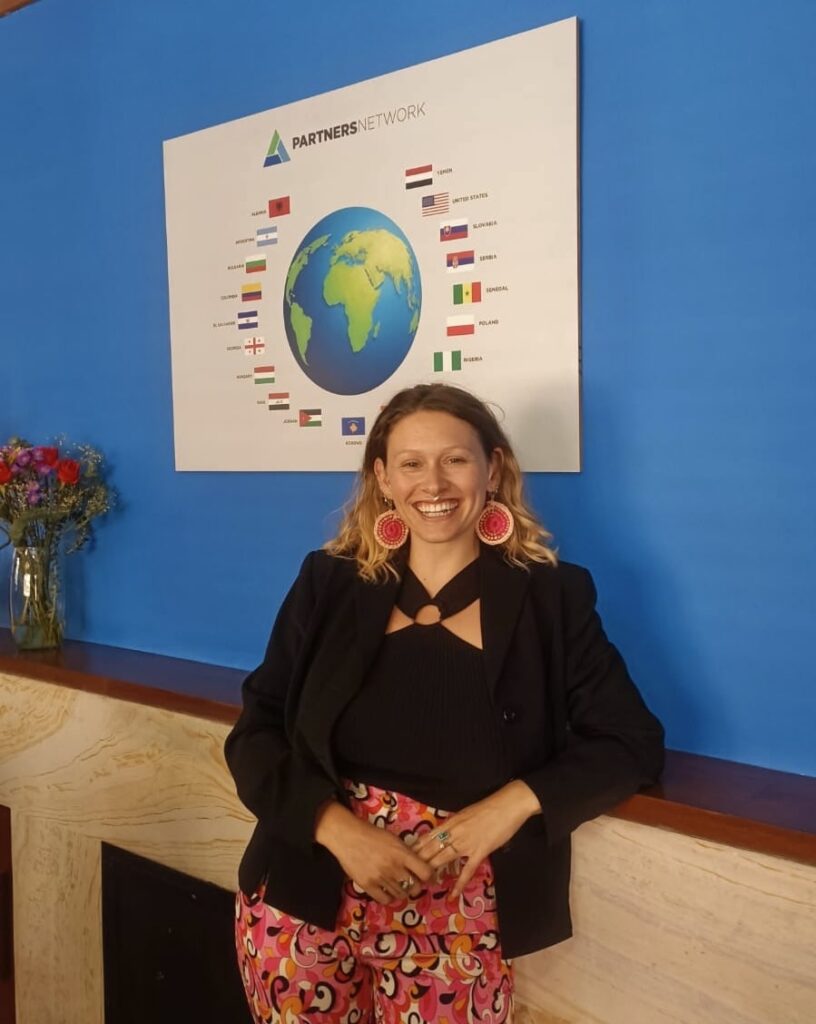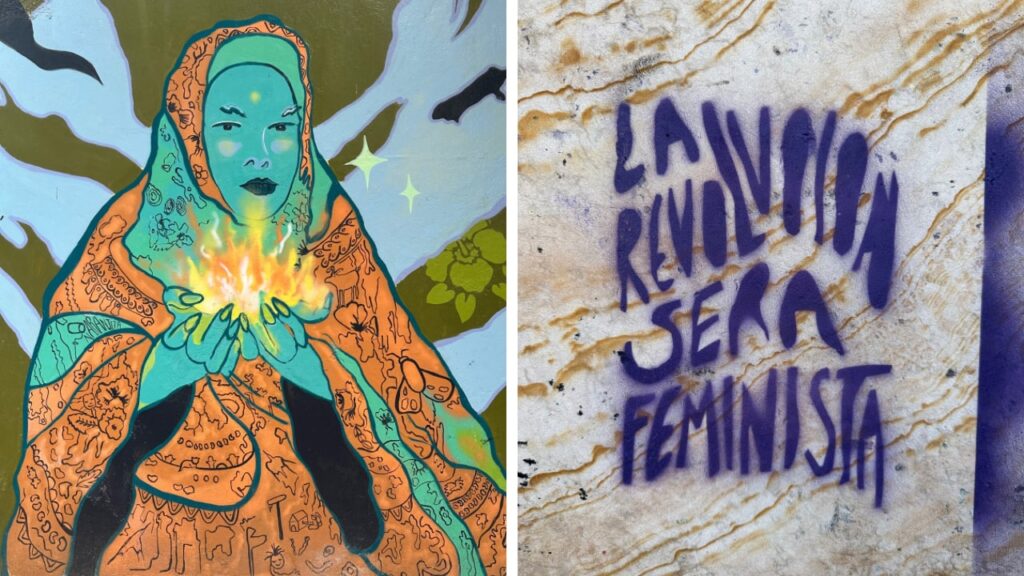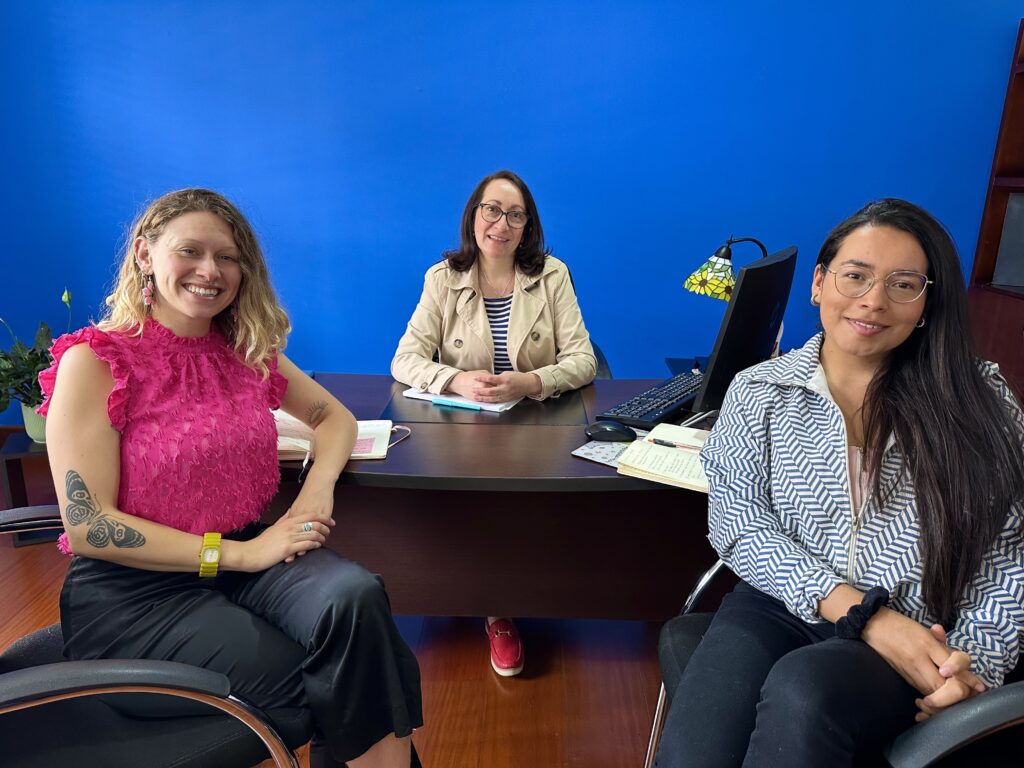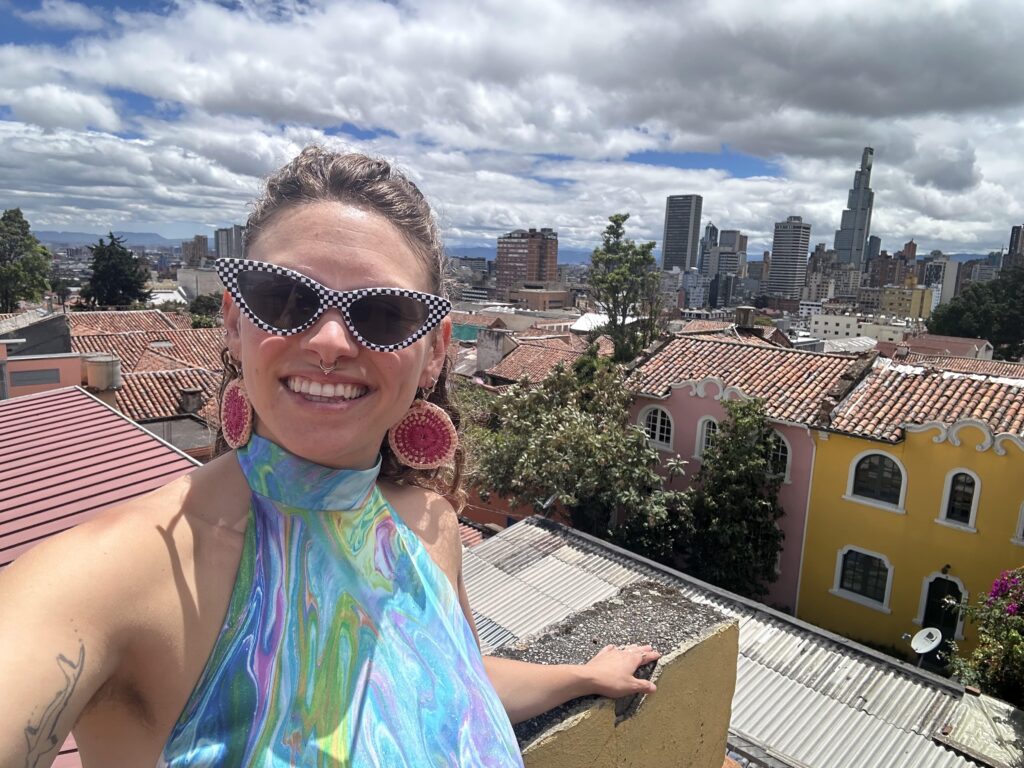“Threading Stories to Construct Cultures of Peace in Colombia”
By Jacinta Bailey (UNC Global Studies ’25)
Summer 2024 AFE Blog Post Series
Most mornings, as the sun rises over Bogotá, the cool mountain air holds the thick clouds firmly in place. Surrounding the city, the clouds give Colombia’s Capital a magic quality. As I rise to greet the day, my hands gain strength and warmth from the hot cup of Colombian tinto ‘black coffee’ which guides me in my morning ritual of gratitude. Gazing out across this vast and bustling cityscape, there is certainly much to be grateful for; four weeks into my AFE I am feeling grounded, I’ve grown accustomed to the four seasons that float through the city on any given day, I am deepening new friendships, honing new skills, and I am relishing in the charm and chaos of life here in South America’s second largest city.
The decision to complete my Applied Field Experience (AFE) in Colombia was easy. As a second-language Spanish speaker, I was motivated towards an opportunity that would strengthen my professional language proficiency, expand my expertise, and nurture my networks for social change within the Latin American region. Partners Colombia, a local peacebuilding arm of the global not-for-profit organization Partners Global, was a perfect fit. What I admire most about Partners Colombia is their unwavering commitment to community-led processes and local leadership models that nurture and strengthen cultures of peace.
Having previously worked with Indigenous communities and women in Australia to promote sustainable development, my current work with Partners Colombia enables me to build off my community-development background, weaving grassroots education, public policy advocacy and institutional democratic strengthening together through a lens of peacebuilding, gender justice and social healing. During my AFE, I am contributing to a project that works directly with women, LGBTQI+ communities and local government officials to bridge the divide between public policy needs, promises and actions. Focused in the Bajo Cauca Antioqueña region, a rural province known for its coffee and cocoa production and a place which remains deeply vulnerable to paramilitary violence of the past and present, this project invests in the roots of peace by ensuring good and transparent local government processes and promoting equitable democratic participation of women and LGBTQI+ peoples in the design, development, delivery and evaluation of key public policy agendas. Committed to investing in the roots of peacebuilding, a core component of Partners Colombia’s work is capacity building, education and leadership.
Four weeks in, my work has been multifarious much like the endless array of empanadas available in Bogotá. Working alongside an incredibly skilled and diverse Colombian team, my contributions have focused on strengthening the academic grounding of the project, developing community-based communication materials to support the advocacy of women and LGTBQI+ leaders within Bajo Cauca, as well as, strengthening the educational capacity and confidence of women in engaging with public policy matters that affect them. The highlight so far has been leading a short online workshop for women in the Bajo Cauca region sharing global grassroots examples of women-led empowerment projects that promote participation and self-determination. It was a privilege to share this space with these women, listening and learning from their own community-led initiatives as well as their visions for change. Their lived experiences and stories of exclusion provide critical learnings for transforming systems of inequity. When women are given the opportunity to share stories, invest in their skills and lead change, whole communities benefit.
Looking forward to the next 8 weeks of work, there are many exciting learning pathways emerging. In July, I will be travelling to the territory of Bajo Cauca to lead workshops and open Leadership Dialogues with the community. After decades of violence, restorative justice plays a critical role in this project; constructing spaces for communities that have been marginalised, namely women and LGBTQI+ people, to have their stories heard and have their ideas for change nurtured and invested in, is a critical component of creating an enduring peace.
For those of you unfamiliar with Colombia’s history, it is important to highlight that for close to six decades people across the country faced extreme levels of violence, fear and indignity because of a prolonged civil war between the national government, the FARC (Revolutionary Armed Forces of Colombia), and other paramilitary groups. As the longest enduring civil war in Latin America, generations of Colombians suffered directly under the conflict and these injustices continue to reverberate throughout society today. According to the Centro de Memoria, Paz y Reconciliación in Bogotá, between 1985 and 2019 the conflict resulted in more than 7 million forcibly displaced people, 500 thousand peoples threatened by violence and over 16 thousand children recruited as soldiers, both forcibly and voluntarily. Of course, marginalized peoples were particularly vulnerable to this violence and Indigenous peoples, women and LGBTQI+ communities are disproportionately represented as victims throughout the civil war period. This is evidenced in the high number of recorded sexual assaults, accounting for more than 32 thousand victims between 1958 and 2017, of which women accounted for 92% of cases. Such statistics remind us that war is a feminist issue.
Globally, wars are understood to deepen social inequities, entrench cultures of mistrust, violence, and intensify the marginalization of communities who are already discriminated against. For this reason, ending conflict is never as simple as stopping violence because while the same circumstances of inequity that first inflamed violence remain pervasive in society, peace will be constrained. To truly alleviate conflict, we must then focus on creating cultures of positive peace by strengthening social fabrics of inclusion, equity and wellbeing; more equitable societies are less likely to promote cultures of violence. Throughout these processes, it is essential that marginalized communities are included not only as recipients but vitally, as leaders of these changes. Therefore, transforming violence towards cultures of peace requires a prioritization of the voices that have lived these inequities; change occurs from the bottom and must be reinforced by policies and processes at the top. Communities themselves are the key agents of change.
Almost 8 years since the Colombian Peace Accord was signed in 2016, the nation continues striving towards a culture of peace. Each day working at Partners Colombia I am reminded of an important lesson – peace is not a simple construction but an enduring commitment to creating and reinforcing cultures of peace. Key to this process is the notion of truth-telling. As part of the National Peace Agreement in 2016, Colombia established a truth and memory commission demonstrating its commitment to addressing the country’s collective scars. Across the world we have seen the power of truth and reconciliation commissions in unearthing the wounds left behind by conflict and silence. As an example, Colombia reminds us that cultures of violence cannot be transformed without intentionally turning towards the harm – to collectively see, acknowledge, and hear the truths about violences committed. Only through this commitment to story sharing can cultures transform the hurt into pathways towards healing, reconciliation and peace.
In this regard, Partners Colombia leads by example, openly holding space for restorative conversations within community, their office and with other Nations. In July, for example, I am eager to join a series of meetings with an El Salvadorian delegation as Partners Colombia shares stories, lessons learned and strategies for constructing cultures of peace through restorative justice processes that center women and LGBTQI+ communities. You see, truth-telling is a process that extends beyond borders. It is an operational value of Partners Colombia which works to strengthen cultures of peace not only in the country but within the region. Nurturing cultures of peace, after all, requires a collective process of transformation. Equally, healing takes community investment and leadership; a profound willingness to acknowledge, repair and transform harm.
During my first week of work at Partners Colombia, there was a word my boss used almost continually, desafíos – ‘challenges’. In all honesty, it wasn’t a word yet common to my vocabulary. “In Colombia”, she said, “we don’t say ‘problem’ we say ‘challenge’ because if it is a challenge then that means we have agency over the outcome”. This is the resilient spirit that I adore and learn so much from here in Colombia. After experiencing a civil war that lasted more than double my lifetime, the people still lead from a place of warmth, love and openness. From the office to the empanada stand, Colombians are always willing and determined to discuss the painful parts of their history, not so that they dwell in despair but rather because they know too well that if we cannot discuss the pain and the harms, then we are likely to repeat them.
Story sharing builds bridges. After conflict, truth weaves social fabrics back together. Challenges are overcome through collective action centered on listening.
Nestled in the Andean mountains, Bogotá is a loud burst of color, commotion and dazzling city lights that extend far beyond the boundary of which the eye can see. Staring out across the vast skyline, I can see fresh rain clouds swirling on the horizon and hear the buzz of Bogotá coming to life below. As a community development professional, I have long believed that without learning a peoples’ culture, you can never truly comprehend their needs, desires or challenges.
Culture of course, is not just the food, music and language that enliven our streets, so importantly, it is the ways in which we relate to one another; the stories we choose to tell and the why, how and who is behind the telling. Put simply, culture is how we build and maintain Community.
As a Rotary Peace Fellow, Colombia has reinforced the importance of culture as a foundation for peacebuilding. Here, I am reminded that peace takes time. It is not easily constructed from one conversation or one national agreement. Rather, peace is formed through many challenging conversations, over many cups of tinto and artfully weaved together through the confident, joyous and open rhythm of salsa which together create la vida Colombiana.



